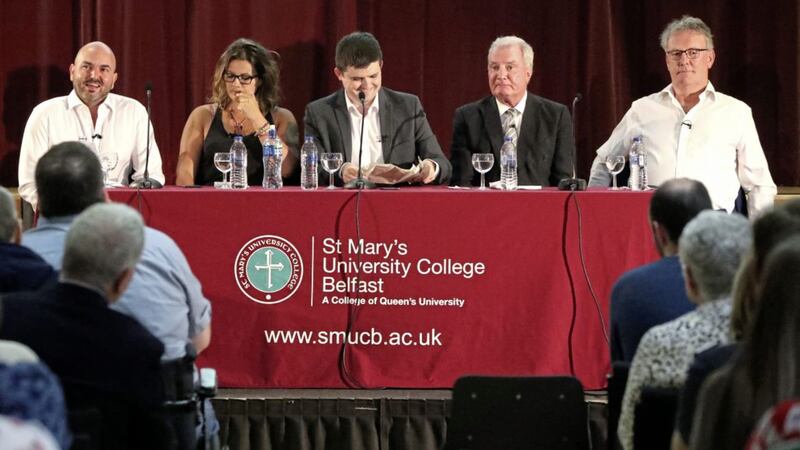HITTING the same notes repeatedly might just be counter-productive for unionism and is surely bad for nationalism. Halfway through August, it may already be time to rethink the rethink.
The failure of unionist leadership has been knocked down and dragged out. Spirited individuals winging it in the absence of concerted civic unionism, last week's Féile panel did not miss and hit the wall.
Maybe it's unfair to suppose that trademark Féile self-congratulation quelled with ease any instinct in the audience to yell, 'Ah come on, we're not perfect ourselves'.
Obstetrics specialist Dr Jim Dornan, a Northern Ireland Labour Party member in the 1960s, said the level of unionist leadership made him embarrassed and angry; he wants Irish universities to help open discussion about the future.
Unionism, said former PUP press officer Sophie Long, did not support British values on culture and race because it was "about power and control".
David Honeyford, a member of the short-lived NI21 and now Alliance, cheerfully imagines an inclusive united Ireland but says Protestants from his background will always associate Sinn Féin with the past.
Of the four, only Mike Nesbitt has held anything remotely like a leader's position - 'remotely' the right descriptor for the tenure of a charming PR man.
As often when one lot of us talks to the other in a formal setting, there was some acting up.
Mike said making the case for unionism was a "job not done well and I include myself in that".
After Jim Dornan's "embarrassed and angered" remark, what Mike recalled was "pin a Union Jack rosette on a donkey" as the old supposed electoral fail-safe. "It worked for me."
After the slightest pause, the crowd's laugh sounded a bit shaken. At a guess the packed room was mostly content to make no sound but occasional grateful laughter, warm applause.
On the way out, some wondered aloud what Mike had told Martin McGuinness that McGuinness kept confidential, that would have ended Nesbitt's leadership "in five minutes". (Some may still be baffled by his selective education - "a crime against our children" - and wholehearted support for abortion provision.)
Fairness demands qualification. This quartet showed gumption by showing up. Their sharpest points should have resonated later if they failed to pierce at the time.
They agreed for example that because Sinn Féin spoke for the IRA they cannot credibly lead discussion of what a united Ireland should look like, nor the argument for a border poll.
They regretted Arlene Foster doubting she could live in a united Ireland but did not rubbish her dismay at the prospect of being "assimilated".
And how could they? Who wants to be assimilated? The word got away in the smoke of Foster's apparently spontaneous declaration.
Most reaction at the time deplored it as yet another example of almost wilful refusal to give leadership.
Long showed the most sympathy; this was possibly, she thought, still post-traumatic stress from the IRA shot that injured Foster's father.
But on assimilation Arlene is right for once, if characteristically tone-deaf.
Of course unionists should not be required to 'assimilate'. Any more than nationalists from the 1920s to the 1960s should have been coerced by demands that they show loyalty to the Protestant and unionist state created at partition, forced by need, discrimination and dread into pretending they felt loyalty. Small wonder many kept a sullen distance from the entire construct.
The more Irish and Irishness was denied the stronger its roots became, though for decades many were too cowed to own them.
A half-a-century of non-assimilation says unionism, badly-led, needs saving from itself - to remake their identity as the 'pluralist' Britishness some avow.
Political unionists have been slow and unimaginative at their best. They are still crass on Irish.
Even some supposedly sophisticated voices distrust, even abhor political republicans while ignoring or explaining away loyalist paramilitaries.
Many are baffled, still, or profess to be, by northern Catholic refusal to use the proper, legal, formal name of 'Northern Ireland'. Simple, really; it was foisted, with the apparatus of a partisan state, on an unwilling people.
Maybe northern nationalists could have been wooed - by different unionists.
In the midst of 1920s fake news and chilly southern indifference, the surest peaceable recourse was to geographical fact. 'The north' hung on.
If Ireland is to be peaceably united, northern unionists, like nationalists certainly need to rethink.
That was a good Mike line: "I haven't heard, 'We want you.'" But on Sunday night the Shankill may have heard the Wolfe Tones.








